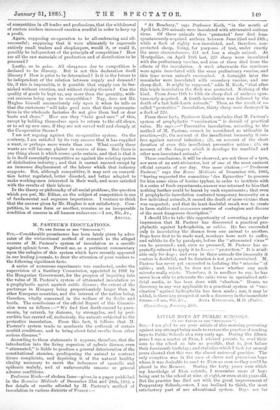M. PASTEUR'S INOCULATIONS.
pro THZ EDITOR OF THE " spEcrATort.-1 F.IR,—Considerable prominence has been lately given by advocates of the vivisectional method of research to the alleged success of M. Pasteur's system of inoculation as a specific against splenic fever. Permit me, as a pertinent commentary upon the eulogies of this system which have recently appeared in our leading journals, to draw the attention of your readers to the following significant facts.
A series of numerous experiments was conducted, under the supervision of a Sanitary Commission, appointed in 1881 by the Hungarian Government, for the purpose of inquiring into the value of M. Pasteur's system of attenuated inoculation as a prophylactic agent against cattle disease ; the extent of the pasturage in Hungary being proportionately larger than in other European countries, and the interest of the nation being, therefore, vitally concerned in the welfare of its flocks and herds. The conclusions of the official Report of this Commission were as follows :—" We find that death caused by pneumonia, by catarrh, by distoma, by strongylus, and by pericarditis has carried off, exclusively, the animals subjected to the protective inoculation. From this fact, it follows that M. Pasteur's system tends to accelerate the outbreak of certain morbid conditions, and to bring about fatal results from other serious diseases."
According to these statements it appears, therefore, that the introduction into the living organism of splenie disease, even "attenuated," is liable to produce a general deterioration of the constitutional stamina, predisposing the animal to contract divers complaints, and depriving it of the natural healthy vitality necessary to resist the influences of sporadic and epidemic malady, and of unfavourable seasons or general adverse conditions.
Professor Koch—of cholera fame—gives, in a paper published in the Semaine Midicale of December 21st and 28th, 1882, a few details of results afforded by M. Pasteur's method of inoculation in various districts of France :— " At Beachery," says Professor Koch, "in the month of April last, 296 animals were inoculated with attenuated anthrax virus. Of these animals thus protected' four died from spontaneously-acquired anthrax between June 22nd and 24th; while a flock of eighty non-inoculated, and, therefore, nonprotected sheep, living, for purposes of test, under exactly the same circumstances, did not lose a single animal. At Montpellier, on April 18th last, 220 sheep were inoculated with the preliminary vaccine, and nine of them died from the effects of the inoculation. A week afterwards the survivors were again inoculated with the same preliminary vaccine, and this time seven animals succumbed. A fortnight later the remainder were inoculated with secondary vaccine, and one sheep died. It might be supposed," adds M. Koch, "that after this triple inoculation the flock was protected. Nothing of the kind. From June 11th to 13th six sheep died of anthrax spontaneously acquired. A fourth inoculation was followed by the death of a last half-dozen animals." Thus, as the result of socalled "protective" inoculation, thirty sheep were destroyed in a flock of 220.
From these facts, Professor Koch concludes that M. Pasteur's system of prophylactic " vaccination " is devoid of practical value. He says :—" Preventive inoculation, according to the method of M. Pasteur, cannot be considered as utilisable in practice,—(1), On account of the insufficient immunity it confers against natural infection ; (2), on account of the short duration of even this insufficient preventive action ; (3), on account of the dangers which it develops for mankind and other non-inoculated animals."
These conclusions, it will be observed, are not those of a tyro, nor even of an anti-vivisector, but of one of the most eminent official savants of our day. One more citation :—" Professor Pasteur," says the Revue Medicate of December 8th, 1883, "having requested the committee des Epizootiea ' to procure for him some virus of bovine typhus, in order to institute with it a series of fresh experiments, answer was returned to him that nothing further could be learnt by such experiments ; that even if prophylactic inoculation conferred temporary immunity on a few individual animals, it caused the death of more victims than was suspected; and that its least doubtful result was to create in farm stables and communes centres of contagion and disease of the most dangerous description."
I should like to take this opportunity of correcting a popular impression that M. Pasteur has discovered a practical prophylactic against hydrophobia, or rabies. He has succeeded only in inoculating the disease from one animal to another. Dogs have first to be made mad, monkeys have slat to suffer, and rabbits to die by paralysis, before the "attenuated virus" can be procured ; and, even so procured, M. Pasteur has repeatedly refused to apply it to human "protection." It is avails able only for dogs ; and even in these animals the immunity it confers is doubtful, and its duration is not yet ascertained. M. Pasteur has never yet succeeded in isolating the " microbe" of rabies ; and, indeed, he does not know whether any such microbe really exists. Therefore, it is needless to say, he has never been able to attenuate the rabic virus in specialised artificial media, as has been done with "charbou." Hence, no discovery in any way applicable to a practical system of "vaccination" against hydrophobia has been made ; nor, it may be added, is there any prospect of such a discovery in the immediate future.—I am, Sir, &c, ANNA. KINGSFORD, M.D. (Paris). Shretcsbury, Januar!! 28th.


































 Previous page
Previous page